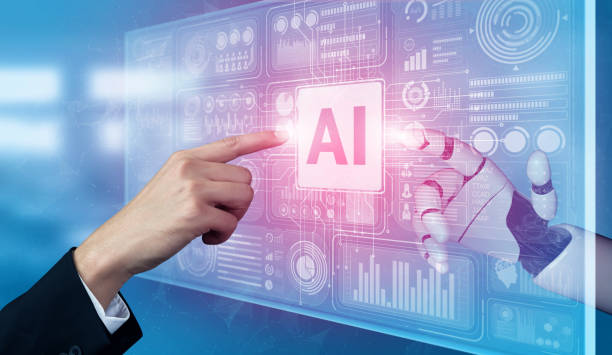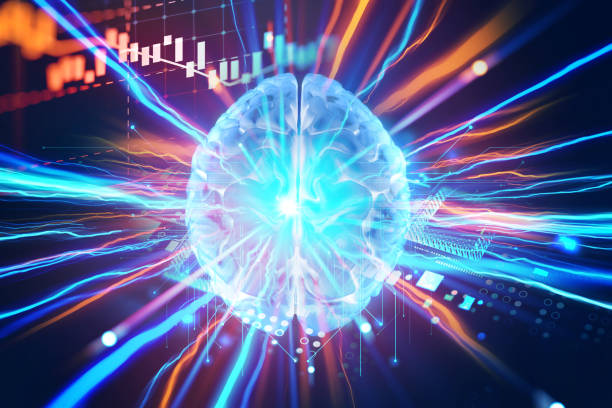Introduction to Pocket AI
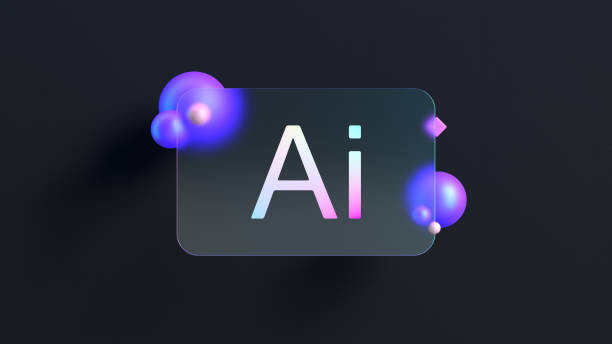
In today’s fast-paced world, #technology is rapidly advancing, and #mobile_AI is considered one of the most prominent examples of this transformation.
You no longer need access to supercomputers or large servers to harness the power of #AI; with the emergence and expansion of #mobile_AI_applications, these capabilities are now directly in your pocket.
This powerful #smart_assistant not only simplifies our daily tasks but also assists us in specialized fields, promising a #future_of_technology where every individual has access to a personal smart assistant.
From natural language processing to image recognition and data analysis, the capabilities of these applications are endless, and their diversity and depth are increasing day by day.
This explanatory introduction provides a foundation for a better understanding of this phenomenon and highlights its importance in our modern lives.
Did you know that poor online store design can drive away up to 70% of your potential customers? Rasawb transforms your sales with professional and user-friendly e-commerce website designs.
✅ Significant increase in sales and revenue
✅ Full optimization for search engines and mobile
⚡ [Get Free Consultation from Rasawb]
How AI Works on Mobile Platforms

The performance of Artificial Intelligence on mobile devices is a complex combination of on-device AI and Cloud AI.
Mobile AI applications use special chipsets with Neural Processing Units (NPUs) to perform AI tasks locally and quickly.
These local processing capabilities are ideal for tasks such as facial recognition, initial speech processing, and image enhancement, as they do not require an internet connection and better preserve user privacy.
On the other hand, for more complex tasks that require high computational power and access to vast datasets, applications utilize cloud services.
For example, an advanced voice assistant might process the initial request on the device, but for more accurate understanding and responding to complex questions, it sends data to cloud servers.
Understanding this interaction between local and cloud processing is highly specialized and essential for developers and users of mobile AI applications, helping them achieve the best performance from this technology.
This dual approach ensures that mobile AI applications benefit from both local speed and security, as well as the unlimited processing power of the cloud.
Prominent Benefits and Applications of AI Applications
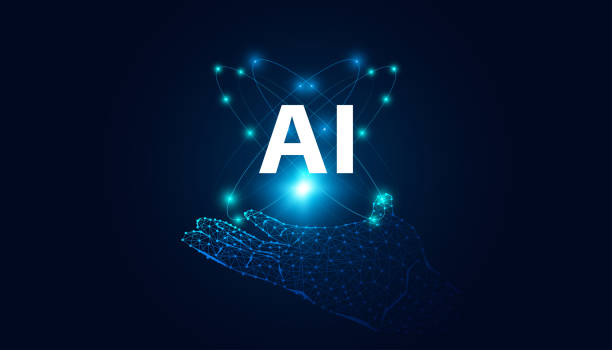
Mobile AI applications have brought a wide range of benefits and applications into our daily lives, many of which are educational and guidance-oriented.
In the realm of productivity, these applications help users manage their time more efficiently by organizing emails, scheduling meetings, and even suggesting automatic replies.
For example, an AI-powered task management application can prioritize your tasks based on urgency and importance, and even provide smart scheduling.
In the health sector, mobile AI applications can act as a personal medical assistant; from monitoring physical activities and sleep patterns to analyzing early symptoms of diseases and providing health recommendations.
These programs can even assist patients in managing their medications.
In the entertainment domain, these applications have revolutionized user experience with personalized content suggestions, augmented reality filters, and intelligent games.
These features are not only entertaining but also have educational aspects; for instance, language learning applications that simulate more realistic conversations with AI.
Below are some common applications of these apps:
| Category | Usage Example | Example App |
|---|---|---|
| Productivity | Email and Calendar Organization | Spark Mail (with AI capabilities) |
| Health and Fitness | Activity and Sleep Monitoring | Sleep Cycle (with AI analysis) |
| Entertainment | AR Filters and Content Suggestions | Snapchat, TikTok |
| Education | Language Learning and Problem Solving | Duolingo, Photomath |
Challenges and Limitations of Implementing AI on Mobile
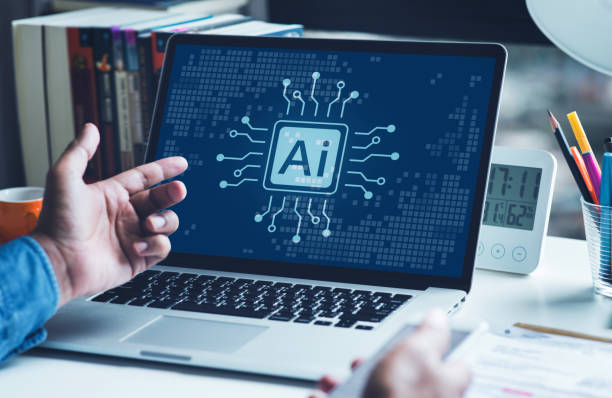
Despite significant advancements, implementing AI on mobile devices comes with considerable challenges and limitations that are analytical and sometimes questionable in nature.
One of the main limitations is the processing power of smartphones compared to powerful servers.
Complex machine learning models require significant computational resources that might exceed the capacity of a mobile device.
This leads to the design of lighter and optimized models for mobile, which sometimes have lower accuracy.
Another challenge is battery consumption.
AI operations, especially NPU-based processing, can have high power consumption and significantly reduce the device’s battery life.
Data privacy is also a major concern.
Although some processing is done on-device, many mobile AI applications require sending data to the cloud for full functionality.
This raises concerns about the security and privacy of users’ personal information.
Furthermore, the volume of data required to train AI models and the need for continuous updates can impose a significant burden on internet bandwidth and device storage.
These limitations compel developers to innovate and find smart solutions to provide the best user experience, while also raising questionable content regarding the future and sustainability of this technology.
Are you frustrated with the low conversion rate of your online store?
Rasawb is your definitive solution with professional e-commerce website design!
✅ Increase your sales and revenue
✅ Unparalleled user experience for your customers
⚡ Get a free consultation now!
Types and Categories of Mobile AI Applications
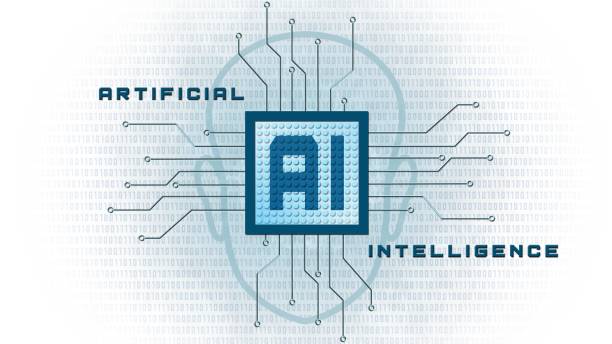
Mobile AI applications fall into various categories, each fulfilling different needs by focusing on specific AI capabilities.
These categories help us gain a more comprehensive understanding of the diversity and complexity of this technology, and are mostly educational and specialized in nature.
One of the most common categories includes smart voice assistants like Siri, Google Assistant, and Bixby, which use Natural Language Processing (NLP) to understand and respond to voice commands.
Another category is image recognition and machine vision applications, which implement capabilities such as facial recognition, object identification, and text scanning (OCR); a prominent example is Google Lens.
Language translation applications, like Google Translate, use AI for instant text and voice translation and play a significant role in international communication.
Additionally, programs focused on personalized learning and education optimize educational content by analyzing user learning patterns.
Health and fitness applications also analyze biometric data using phone sensors and AI, providing personalized recommendations.
Each of these types of mobile AI applications has unique capabilities and demonstrates the enormous potential of this technology in our daily lives.
Future Trends and Upcoming Developments in Mobile AI
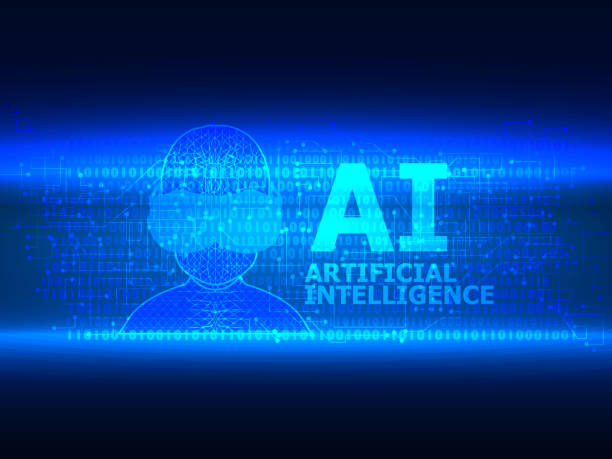
The future of mobile AI applications is full of promising trends and exciting news developments that will push the boundaries of what a mobile device can do.
One of the most important upcoming trends is the expansion of Edge AI.
This technology means performing more and more AI processing locally on the device itself, without the need to send data to the cloud.
This not only increases response speed but also significantly enhances user privacy.
Advancements in mobile hardware, especially new generation chipsets with more powerful NPUs, will accelerate this trend.
Another important trend is more personalized user experiences.
Mobile AI applications will increasingly be able to understand user habits, preferences, and even emotional states, personalizing content and services in an unprecedented way.
This means smart assistants that truly know you and anticipate your needs.
We will also witness the convergence of AI with Augmented Reality (AR) and Virtual Reality (VR) on mobile, leading to the creation of immersive and intelligent experiences.
Ethical concerns and the need for responsible AI will also be in focus.
Developers and companies will concentrate on developing transparent, fair, and unbiased AI to ensure that this technology is used for the benefit of all humanity.
These analytical trends indicate that the future of these applications is very bright and full of unparalleled potential.
Guide to Choosing and Using the Best AI Applications
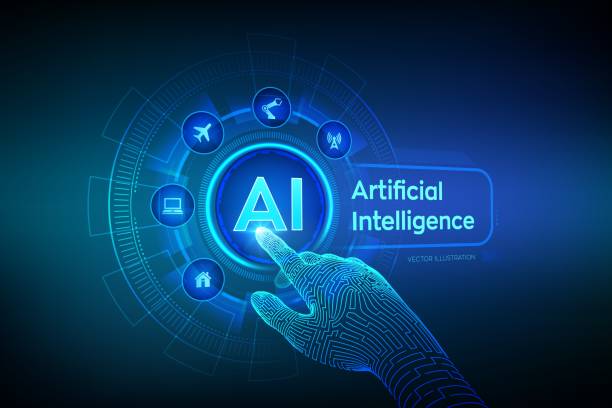
Choosing the best mobile AI application from countless options available in the market can be challenging.
This guide will help you make the best choice based on your needs.
The first step is identifying your needs.
Do you need a productivity assistant, or are you looking for a tool for creativity, education, or entertainment? Second, pay attention to the application’s features and functionalities.
Does the application support on-device processing (for privacy) or is it more reliant on cloud connectivity? Is its user interface simple and understandable? Also, checking user reviews and ratings in app stores can provide valuable information about the application’s stability, performance, and support.
Pay special attention to data privacy and security.
Read the application’s privacy policies and ensure your information is properly protected.
Some applications offer more features for data control to users.
Finally, consider pricing; is the application free with ads, or is it subscription-based? The table below lists some popular applications and their uses to help you choose:
| App Name | Main Use | Highlights |
|---|---|---|
| ChatGPT (OpenAI) | Conversation, Text Generation, Brainstorming | Extensive NLP capabilities, creative responses |
| Google Assistant | Voice Assistant, Smart Device Control | Deep integration with Google ecosystem |
| Lensa AI | Image Editing, Photo to Art Conversion | Advanced image generation capabilities |
| Duolingo | Language Learning | Personalized learning, interactive exercises |
Impact of AI Applications on Daily Life

Mobile AI applications are rapidly changing how we live, work, and interact with the world around us, and their impact on our daily lives is entirely entertaining yet profound.
These applications help us automate repetitive tasks, access information faster, and even make better decisions.
At home, smart home systems controlled by AI-powered mobile applications enable managing lights, thermostats, and security systems with just a voice command or screen touch.
At work, these applications assist in project management, data analysis, and even market trend prediction, leading to increased productivity and reduced errors.
Even in simple activities like shopping, mobile AI applications provide personalized suggestions by analyzing our shopping habits, making the shopping experience more pleasant.
Navigation applications optimize our travel time by predicting traffic and suggesting the best routes.
The impact of these applications in the entertainment sector is also significant; from suggesting music and movies based on our taste to mobile games with adaptive AI that make the gaming experience more dynamic.
These changes have made our lives easier, more connected, and more enjoyable, but at the same time, they compel us to adapt to new lifestyles and interactions with technology.
Overall, mobile AI is no longer a luxury technology but has become an indispensable component of modern life.
Is your current e-commerce website design not generating the sales you expect?
Rasawb is an expert in professional e-commerce website design!
✅ An attractive and user-friendly website aimed at increasing sales
✅ High speed and security for an ideal shopping experience⚡ Get a free online store design consultation with Rasawb!
Security and Ethical Considerations in the Development and Use of Mobile AI

Despite numerous benefits, the development and use of mobile AI applications also come with serious security and ethical considerations that require an analytical and sometimes questionable approach.
One of the biggest concerns is data privacy.
Effective AI applications often require access to a large volume of users’ personal information, including location, contacts, images, and even health data.
This data can be misused in case of a security breach.
Developers must ensure that data is securely encrypted and used only for specified purposes and with user consent.
The issue of Bias in AI is also a significant ethical concern.
If AI models are trained with biased data, they can act discriminatorily and make unfair decisions, especially in areas such as employment, credit assessment, and even medical diagnoses.
This issue can exacerbate social inequalities.
Transparency in how AI operates and the ability to explain its decisions (Explainable AI) are also crucial for users to trust this technology.
Furthermore, issues related to data ownership and accountability for AI errors are also hot topics.
For mobile AI applications to become useful and reliable tools, strong legal and ethical frameworks must be developed and implemented for their development and use to prevent misuse and ensure societal benefits.
Revolutionizing Education and Learning with Mobile AI
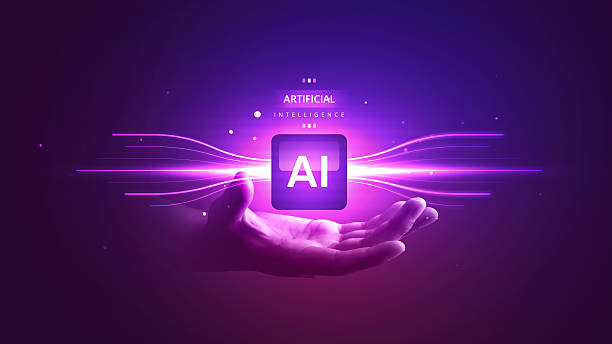
Mobile AI applications are creating a true revolution in the fields of education and learning, transforming the learning experience for millions worldwide by providing personalized and interactive educational content.
These applications use AI algorithms to analyze each student’s learning patterns, identify their strengths and weaknesses, and then adjust content, exercises, and feedback to individual needs.
For example, a mobile AI application can detect your learning speed and present new material at a pace that is suitable for you.
This adaptive approach, unlike traditional methods that apply uniformly to everyone, helps students understand concepts more deeply and increases information retention.
Additionally, these applications offer valuable tools for language learning, solving mathematical problems, and even practicing complex skills.
Some of them use Natural Language Processing to simulate real conversations or provide instant feedback on pronunciation.
These capabilities make learning not only more effective but also more enjoyable.
With easy access via mobile, AI education has become accessible to people of all ages and circumstances, holding immense potential to reduce educational gaps and increase global literacy.
This transformation demonstrates how AI can play a key role in building a more knowledgeable and capable future.
Frequently Asked Questions
| Number | Question | Answer |
|---|---|---|
| 1 | What is a mobile AI application? | A mobile AI application is a program that uses Artificial Intelligence capabilities (such as machine learning, natural language processing, computer vision) to provide smarter and more automated experiences on mobile devices. |
| 2 | Why is AI important in mobile applications? | Its importance is due to increased efficiency, personalized user experience, task automation, improved decision-making, and the provision of innovative features such as facial recognition or voice assistants. |
| 3 | What are some examples of mobile applications with AI? | Voice assistants (such as Siri, Google Assistant), navigation apps with real-time traffic (Google Maps), image filters (Snapchat, Instagram), language translation apps, and facial recognition applications. |
| 4 | What challenges exist in developing mobile AI applications? | Hardware limitations of mobile devices (processing power, battery), the need for large and high-quality data, user privacy protection, and the complexity of implementing AI models. |
| 5 | What is the role of machine learning in these applications? | Machine learning allows the application to learn from data, identify patterns, and improve its performance over time, such as in product recommendation systems or speech recognition. |
| 6 | Do mobile AI applications require an internet connection? | Many advanced AI features require an internet connection and cloud processing, but some lighter models can also work “on-device” (without internet). |
| 7 | How does AI help improve user experience on mobile? | By personalizing content, anticipating user needs, automating repetitive tasks, and providing more natural user interfaces like voice commands. |
| 8 | What is the difference between cloud AI and on-device AI in mobile? | Cloud AI uses powerful servers for processing (requires internet), while on-device AI performs processing directly on the phone itself (no internet required, but with processing limitations). |
| 9 | What will be the future of mobile AI applications? | We expect to see increased personalization capabilities, deeper integration with phone sensors, the development of smarter assistants, and advancements in on-device processing. |
| 10 | Which frameworks are popular for AI development on mobile? | TensorFlow Lite (for Android and iOS), Core ML (for iOS), and PyTorch Mobile are among the popular frameworks for implementing AI models in mobile applications. |
And other services of Rasawb Advertising Agency in the field of advertising
Smart Custom Software: A dedicated service for growth in customer behavior analysis based on custom programming.
Smart Press Release: A new service to increase customer attraction through marketing automation.
Smart Custom Software: A fast and efficient solution to increase click-through rates by focusing on real data usage.
Smart Digital Advertising: An effective tool to increase click-through rates with the help of custom programming.
Smart Direct Marketing: Professional optimization to improve SEO ranking using Google Ads management.
And over hundreds of other services in internet advertising, advertising consultation, and organizational solutions
Internet Advertising | Advertising Strategy | Advertorials
Sources
Articles related to mobile AI in Digiato
Search for mobile AI applications in Zoomit
Digital transformation news in IRNA news agency
AI strategies in mobile applications (Ministry of Communications)
? Are you looking for your business to grow and be seen in the digital world? Rasawb Afarin Digital Marketing Agency, relying on up-to-date knowledge and extensive experience in user-friendly website design and implementing effective online marketing strategies, is always ready to assist you in achieving great successes.
📍 Tehran, Mirdamad Street, Next to Central Bank, Southern Kazeroun Alley, Ramin Alley, No. 6

